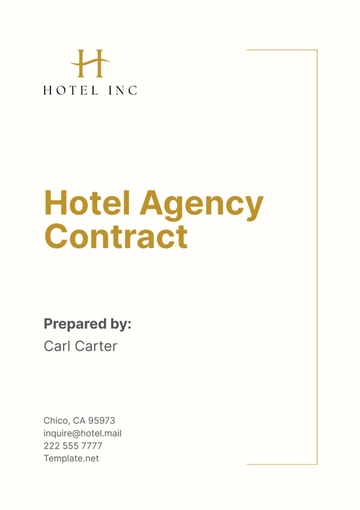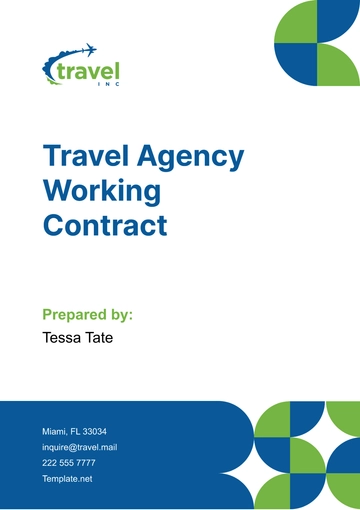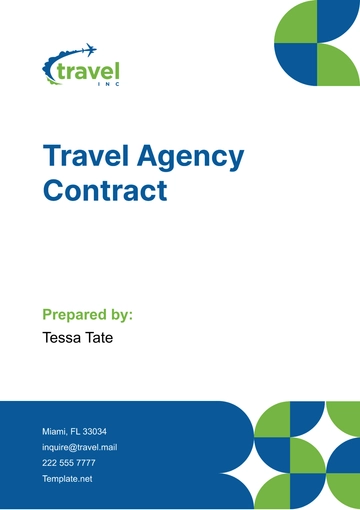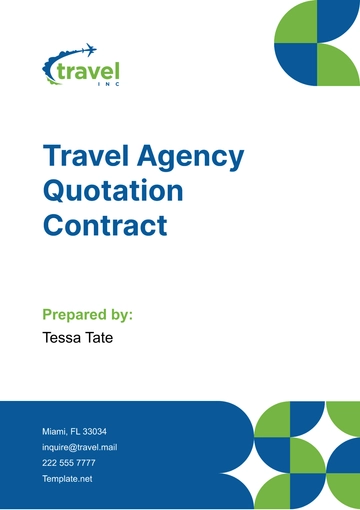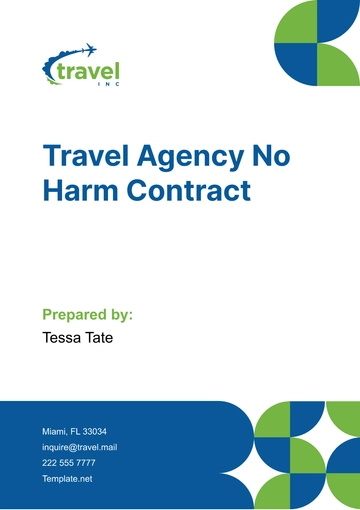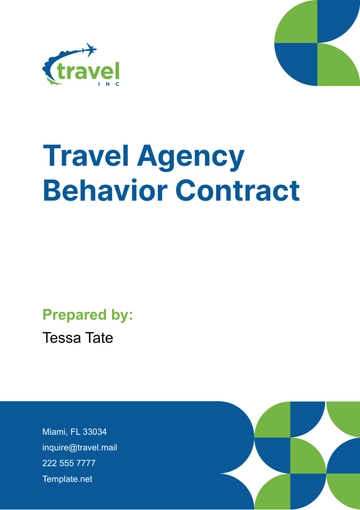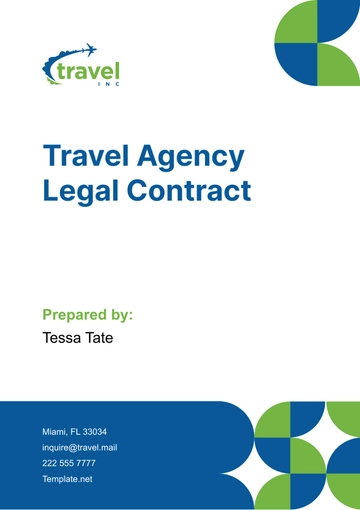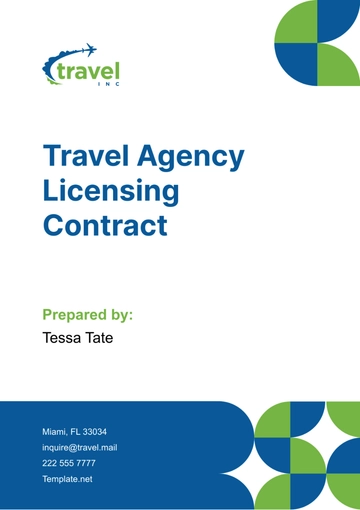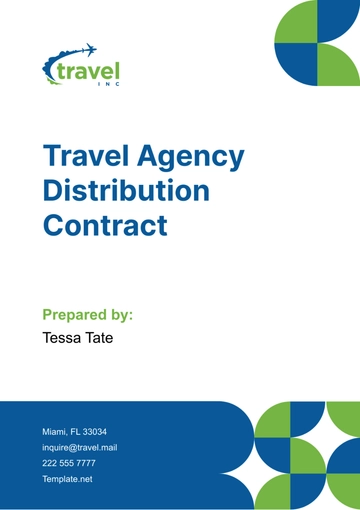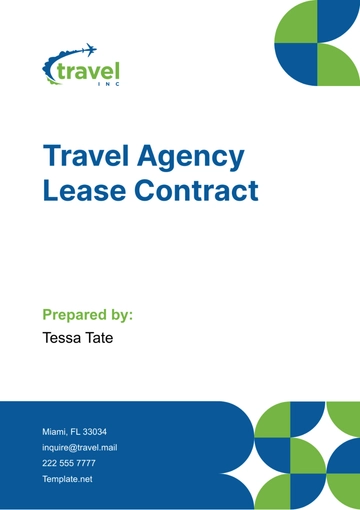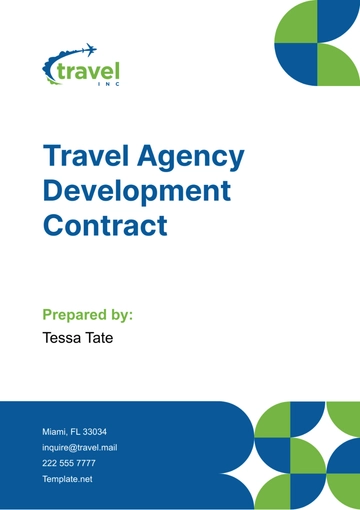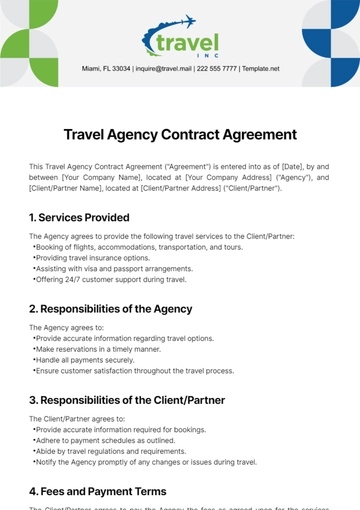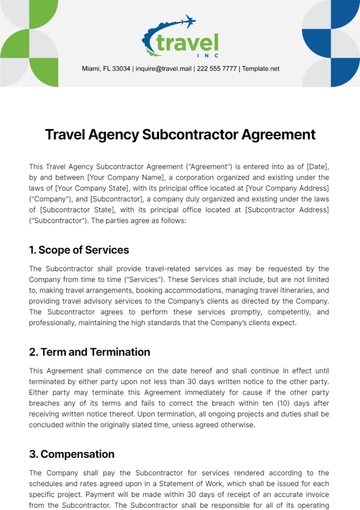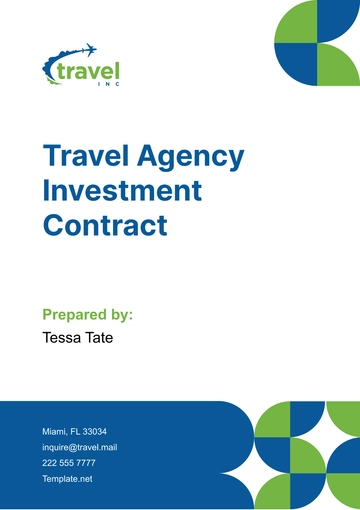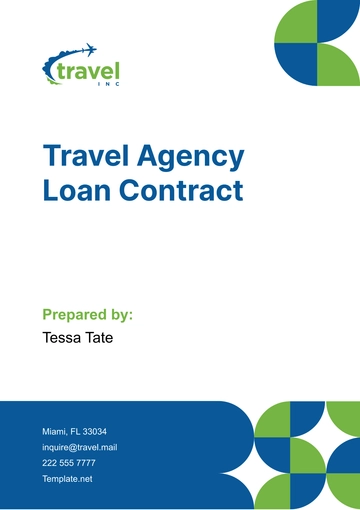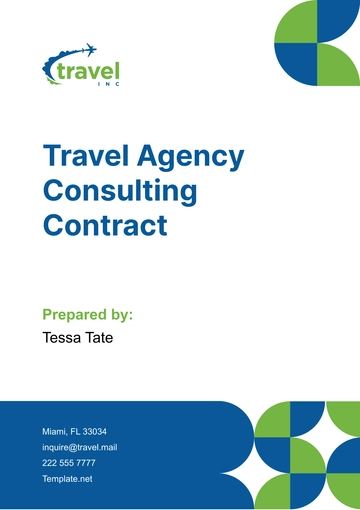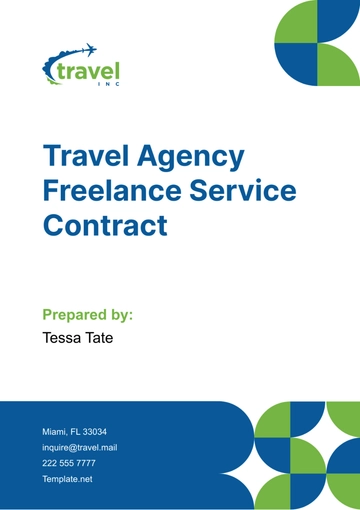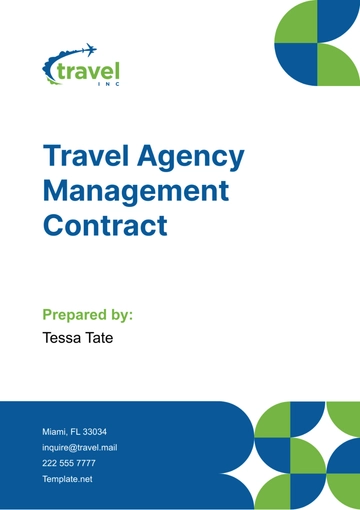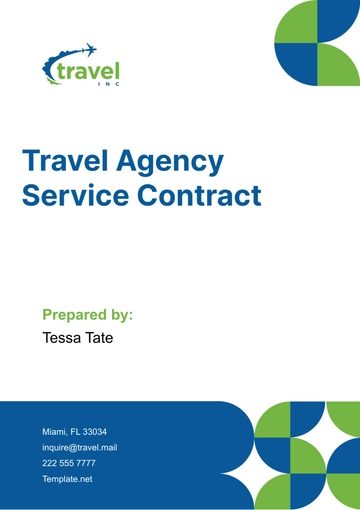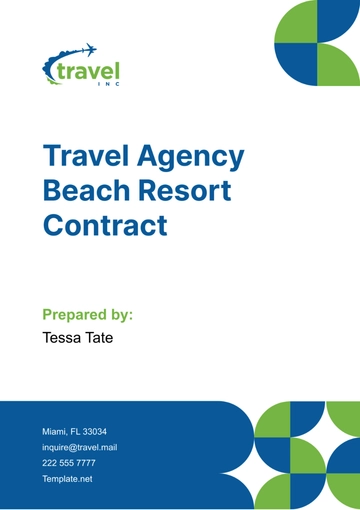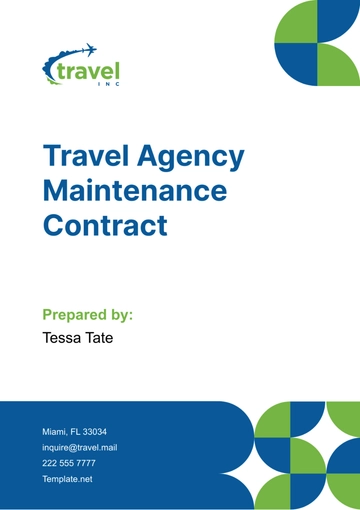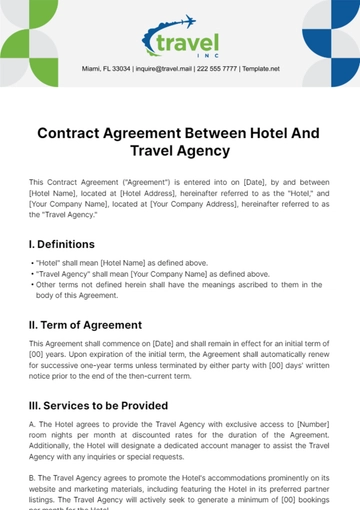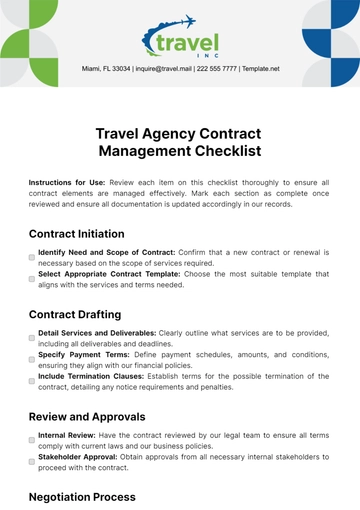Free Travel Agency Lease Contract
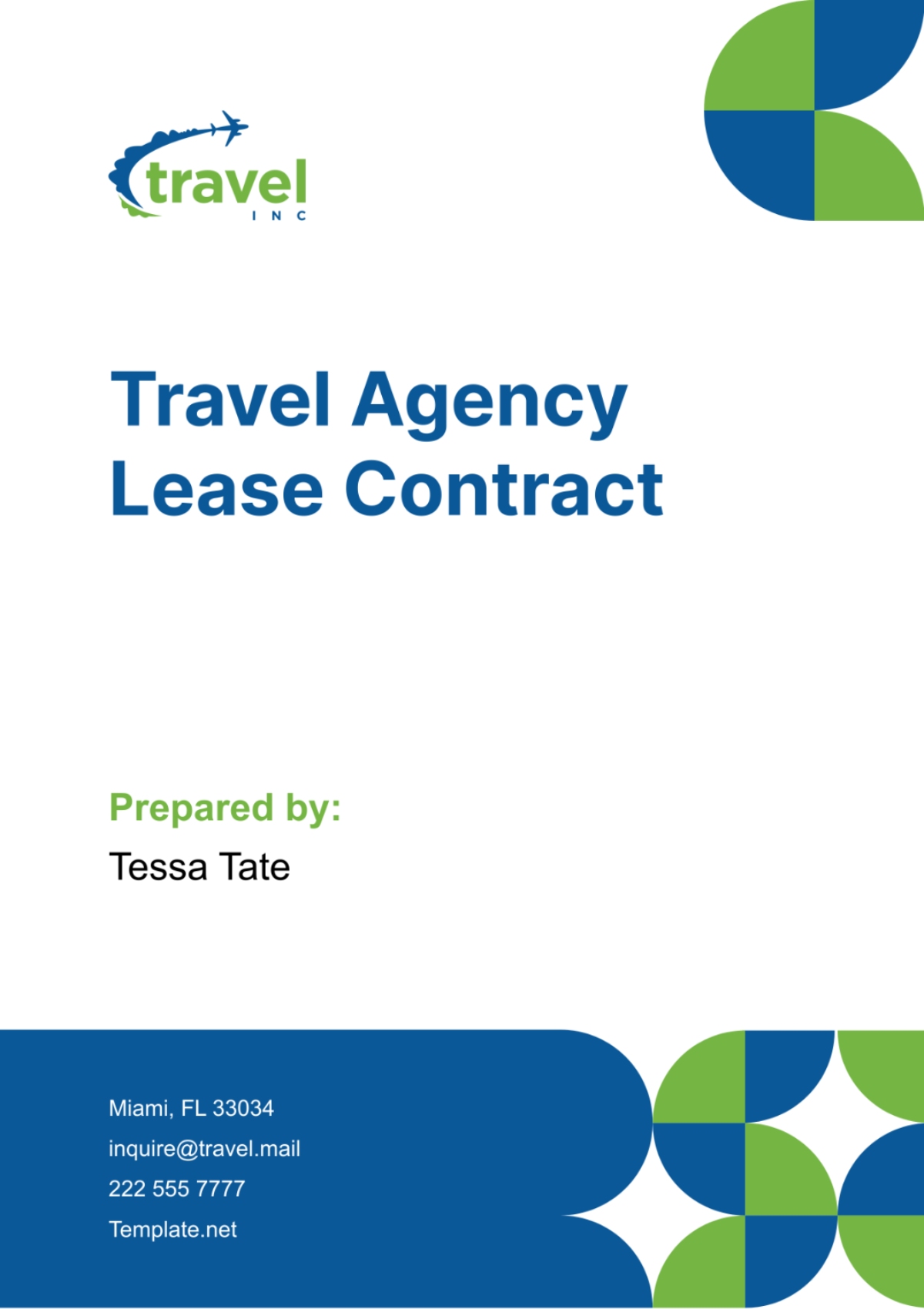
This Travel Agency Lease Contract ("Contract") is made effective as of [Month Day, Year] by and between [Your Company Name] ("Lessee") and [Landlord / Property Name] ("Lessor").
1. Premises
The leasing agreement delineates that the Lessor will lease to the Lessee the designated property located at [Complete Address of Leased Property] ("Premises"). This section clarifies several essential aspects:
Designated Use: The Premises are to be utilized exclusively for the operation of a travel agency. This includes all activities directly related to the management and operation of travel services, ensuring that the use remains focused and relevant to the travel agency business.
Compliance with Local Laws: Any operations conducted on the Premises must strictly adhere to local laws and regulations. This compliance ensures that the travel agency operates within legal boundaries and maintains good standing in its business practices.
2. Term
The duration of the lease is a fundamental component of the Contract, specifying the commencement and expiration dates of the agreement:
Commencement Date: The lease agreement will begin on [Start Date], marking the start of the Lessee's occupancy and utilization of the Premises for business operations.
Expiration Date: The lease is set to expire on [End Date], unless an earlier termination is necessitated by either party in accordance with the lease provisions. This fixed term provides both parties with a clear timeline for the lease duration, allowing for future planning and commitments.
Early Termination: Provision for early termination includes circumstances under which either party may terminate the agreement prior to the End Date, subject to compliance with the terms specified within the Contract. This may include breaches of the lease, non-payment of rent, or other significant factors.
3. Rent
Rent is a critical component of the lease agreement, detailing the financial obligations of the Lessee towards the Lessor:
Monthly Rent: The Lessee shall pay to the Lessor a monthly rent amounting to [Specify Amount]. This rent reflects the value of the leased property and is determined based on the location, market conditions, and other relevant factors.
Payment Schedule: Rent is payable on or before the [Payment Day of Each Month], ensuring a regular and predictable payment flow. This regularity is crucial for both parties for financial planning and management.
Initial Payment: The first month’s rent is due upon the signing of this Contract, serving as a commitment that secures the Lessee’s occupancy of the Premises.
4. Security Deposit
The security deposit is a critical component of the leasing agreement, serving as a financial guarantee for the Lessor against any potential damages or breaches of the contract by the Lessee:
Amount: Upon the execution of this Contract, the Lessee is required to deposit a sum of [Specify Amount] with the Lessor. This amount is determined based on the value of the Premises and the potential risks associated with its use.
Purpose: The primary purpose of the security deposit is to secure the Lessee’s faithful performance of the terms outlined in the Contract. It acts as a safety net, ensuring that the Lessor has some financial recourse in case of damages or non-compliance with the lease terms by the Lessee.
Refund: At the termination of the lease, the security deposit will be returned to the Lessee, subject to the provisions of the Contract. The conditions for the return of the deposit typically include deductions for any damages to the Premises that go beyond ordinary wear and tear, or any outstanding payments owed by the Lessee.
5. Use of Premises
This clause specifies the approved use of the leased Premises and the compliance responsibilities of the Lessee:
Designated Use: The Lessee shall use the Premises solely for the operations of a travel agency. This restriction ensures that the activities conducted on the Premises align with local zoning laws and the Lessor’s property management policies.
Restriction on Other Uses: Any use of the Premises other than as a travel agency requires the prior written consent of the Lessor. This clause prevents unauthorized activities that could potentially damage the property or cause legal issues for either party.
Regulatory Compliance: The Lessee is also obligated to comply with all relevant governmental and association regulations and ordinances concerning the use of the Premises. This includes adhering to safety standards, privacy laws related to customer information, and any other regulations that apply to travel agency operations.
6. Maintenance and Repairs
The responsibilities for maintenance and repairs are clearly divided between the Lessee and Lessor to ensure the Premises remain in good condition:
Lessee’s Responsibilities: The Lessee must, at their own expense, maintain the Premises in good repair and condition. This includes taking care of all routine maintenance and minor repairs. The Lessee’s responsibilities are crucial for keeping the property functional and aesthetically pleasing, which is beneficial for both the daily operations of the travel agency and the property value for the Lessor.
Exclusions: The clause typically excludes ordinary wear and tear from the Lessee’s responsibilities, acknowledging that some level of deterioration is inevitable over time without implying neglect or abuse of the property.
Lessor’s Responsibilities: The Lessor remains responsible for major structural repairs. This includes addressing issues with the foundation, roof, main plumbing, and electrical systems, which are generally beyond the scope of the Lessee’s usage impacts.
7. Alterations and Improvements
This section outlines the conditions under which the Lessee can make changes to the physical structure or appearance of the Premises:
Permission for Changes: The Lessee may desire to modify the Premises to better suit their operational needs or to enhance the functionality of the space. However, any alterations, additions, or improvements must first receive the written consent of the Lessor. This requirement ensures that all modifications are appropriate and do not compromise the structural integrity or value of the property.
Scope of Changes: The modifications can range from structural alterations to cosmetic improvements, depending on the needs of the Lessee and the terms agreed upon by the Lessor.
Ownership of Improvements: It is crucial to note that any improvements made to the Premises at the expense of the Lessee will become the property of the Lessor upon the termination of the lease. This provision encourages the Lessee to make only those improvements that are necessary for their business operations and beneficial to the property in the long term.
This clause safeguards the Lessor's investment in the property while allowing the Lessee to adapt the space to their business needs, provided that all changes are approved and documented.
8. Insurance
Insurance coverage is a critical aspect of the lease agreement, ensuring that both the Lessee and the Lessor are protected against potential losses:
Types of Required Insurance:
Property Insurance: The Lessee is required to maintain "all risk" property insurance, which covers loss or damage to the Premises from fire and other risks. This type of insurance protects against a wide range of potential damages, ensuring that the property can be repaired or rebuilt in case of significant incidents.
Liability Insurance: The Lessee must also carry liability insurance to cover any claims that might arise from accidents, injuries, or other incidents on the Premises. This insurance protects both the Lessee and the Lessor from potential legal liabilities.
Proof of Insurance: The Lessee is obligated to provide proof of insurance to the Lessor at the commencement of the lease term and subsequently upon the renewal of any policies. This documentation is vital to confirm that the insurance requirements are being met continuously throughout the lease term.
These insurance provisions are designed to minimize financial risks for both parties, ensuring that adequate coverage is in place for the duration of the lease.
9. Termination
The termination clause defines how the lease agreement can be concluded before the natural expiration of its term:
Notice Requirement: Either party may terminate the Contract by providing [Number of Days' Notice] days' written notice to the other party. This notice period allows both the Lessor and the Lessee to adequately prepare for the end of the lease, whether by finding new tenants, relocating the business, or handling other transitional logistics.
Condition of Premises Upon Departure: Upon termination, the Lessee is required to vacate the Premises and return it to the Lessor in good repair, except for ordinary wear and tear. This condition ensures that the Premises is maintained properly throughout the lease and is left in a satisfactory state for future use.
10. Governing Law
This Contract shall be governed by, and construed in accordance with, the laws of [State].
11. Entire Agreement
This Contract constitutes the entire agreement between the parties. No modification or amendment of this Contract shall be effective unless in writing and signed by both parties.
IN WITNESS WHEREOF, the parties hereto have executed this Travel Agency Lease Contract as of the date first above written.
[Your Company Name]
By: 
Name: [Your Name]
Title: [Your Job Title]
Date: [Date]
[Landlord / Property Name]
By: 
Name: [Property Owner Name]
Title: [Job Title]
Date: [Date]
- 100% Customizable, free editor
- Access 1 Million+ Templates, photo’s & graphics
- Download or share as a template
- Click and replace photos, graphics, text, backgrounds
- Resize, crop, AI write & more
- Access advanced editor
Secure your travel agency's operational foundation with our Travel Agency Lease Contract Template from Template.net. This editable and customizable template is specifically designed to meet the unique needs of the travel sector and is easily editable in our AI Editor Tool. Ensure your leasing agreements are professional and comprehensive, saving you time and legal hassles. Enhance your business stability today by choosing our trusted template solutions.
You may also like
- Rental Contract
- Contractor Contract
- Contract Agreement
- One Page Contract
- School Contract
- Social Media Contract
- Service Contract
- Business Contract
- Restaurant Contract
- Marketing Contract
- Real Estate Contract
- IT Contract
- Cleaning Contract
- Property Contract
- Supplier Contract
- Partnership Contract
- Food Business Contract
- Construction Contract
- Employment Contract
- Investment Contract
- Project Contract
- Payment Contract
- Student Contract
- Travel Agency Contract
- Startup Contract
- Annual Maintenance Contract
- Employee Contract
- Gym Contract
- Event Planning Contract
- Personal Contract
- Nursing Home Contract
- Law Firm Contract
- Work from Home Contract
- Software Development Contract
- Maintenance Contract
- Music Contract
- Amendment Contract
- Band Contract
- DJ Contract
- University Contract
- Salon Contract
- Renovation Contract
- Photography Contract
- Lawn Care Contract

